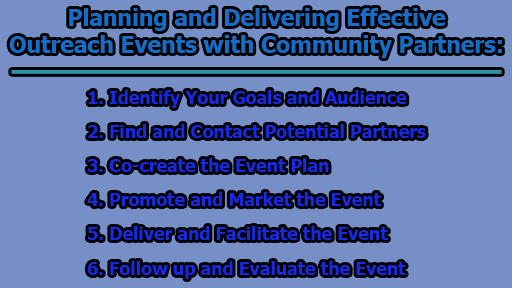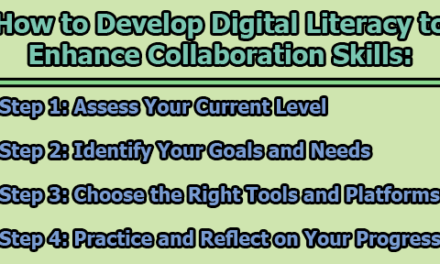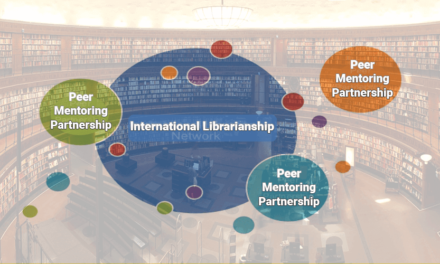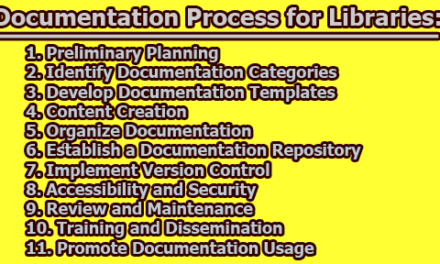Planning and Delivering Effective Outreach Events with Community Partners:
Outreach events are a powerful tool for libraries to promote their services, connect with the community, and forge partnerships with other organizations. However, planning and executing successful outreach events can be a daunting task, especially with limited resources and experience. In this article, we will explore planning and delivering effective outreach events with community partners.
1. Identify Your Goals and Audience: Before embarking on your outreach event journey, it’s essential to have a clear vision of what you want to achieve and who you aim to reach. Consider the following key questions:
- What are the primary objectives of your event?
- How does the event align with your library’s mission and vision?
- Who is your target audience, and what are their needs and interests?
- How will you measure the success of your event?
Answering these questions will help you define your goals and audience, providing a roadmap for the planning process.
2. Find and Contact Potential Partners: Once you have your objectives and audience in mind, start seeking potential partners who share your vision and can contribute to the success of your event. Partners can be other libraries, community organizations, schools, businesses, or individuals with relevant expertise and resources. You can utilize various methods to find and contact potential partners:
- Utilize existing contacts within your network.
- Explore online directories and databases.
- Leverage social media platforms.
- Use word-of-mouth recommendations.
When approaching potential partners, clearly explain your event’s goals, audience, expectations, and how the partnership can be mutually beneficial. Establishing this communication is crucial for building strong collaborations.
3. Co-create the Event Plan: Collaboration is at the heart of successful outreach events. After securing partners, involve them in every aspect of the planning process. This includes choosing the theme, format, location, content, budget, and timeline. Collaborative planning ensures that everyone is aligned, knows their roles and responsibilities, and can contribute their expertise and resources effectively.
Co-creating the event plan fosters trust, rapport, and a sense of shared ownership and commitment among partners.
4. Promote and Market the Event: To ensure your outreach event reaches its intended audience and community, an effective promotion and marketing strategy is essential. Employ a variety of channels and strategies, such as:
- Flyers and Posters: Design eye-catching flyers and posters that provide essential event details. Distribute them within your library and throughout the community, targeting high-traffic areas. Ensure that the design aligns with the event’s theme and message.
- Newsletters and Emails: Leverage your library’s newsletter and email lists to reach your existing patrons. Craft engaging and informative messages that highlight the event’s value and encourage attendance. Send out regular updates and reminders as the event date approaches.
- Event Websites: Create a dedicated event website or webpage on your library’s site. This is an excellent platform for sharing comprehensive event information, registration details, and any associated resources. Ensure the website is user-friendly and mobile-responsive.
- Social Media Platforms: Social media is a powerful tool for reaching a broad audience. Create event pages or posts on platforms like Facebook, Twitter, Instagram, and LinkedIn. Use visually appealing images, engaging content, and relevant hashtags. Encourage your partners to share event information with their followers as well.
- Press Releases: Write and distribute press releases to local media outlets, such as newspapers, radio, and TV stations. Highlight the unique aspects of your event, any notable speakers or partners, and the benefits to the community. Follow up with media contacts to secure coverage.
- Word-of-Mouth Recommendations: Personal recommendations carry significant weight. Encourage your staff, partners, and volunteers to spread the word about the event within their personal and professional networks. Attendees from previous events can also become powerful advocates.
Additionally, tap into your partners’ networks and platforms to expand the reach of your event. Key to your promotional efforts is conveying the value and benefits of the event and creating a compelling call to action. Continuously monitor and evaluate your promotional efforts and adjust them as needed.
5. Deliver and Facilitate the Event: On the day of the event, it’s crucial to ensure a seamless execution. This involves tasks such as:
- Setting up and ensuring everything is ready.
- Welcoming and registering attendees.
- Introducing and thanking speakers and partners.
- Moderating discussions and activities.
- Providing feedback and support.
Be prepared to tackle any unexpected issues that may arise, such as technical glitches, low attendance, or conflicts. The most important aspect of this step is creating a positive and memorable experience for everyone involved.
6. Follow up and Evaluate the Event: Once the event has concluded, it’s not the end of your journey. Following up and evaluating the event is critical for measuring its success and identifying areas for improvement. Some essential post-event steps include:
- Thanking partners and attendees for their participation and contributions.
- Collecting feedback and suggestions from participants.
- Analyzing data and evidence to assess attendance, satisfaction, learning outcomes, and impact.
- Sharing results and lessons learned with partners.
- Identifying strengths and areas for improvement.
Moreover, use this opportunity to explore possibilities for future collaboration and partnership, as a successful outreach event can pave the way for even more impactful future initiatives.
In conclusion, planning and delivering outreach events with community partners can be a rewarding experience for libraries, but it requires careful preparation and execution. By following these steps and incorporating best practices, you can create successful and engaging outreach events that not only promote your library’s services but also strengthen your connections with the community and foster valuable partnerships with other organizations.

Library Lecturer at Nurul Amin Degree College










